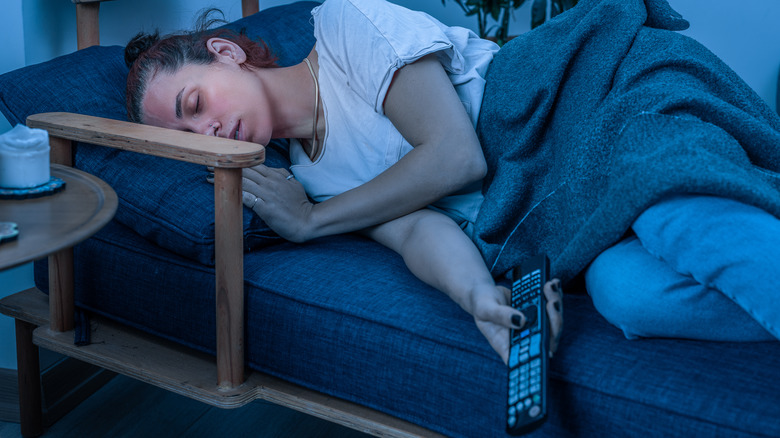Think Twice Before Sleeping With The TV On All Night. Here's Why
Many people keep their televisions running all night while they sleep. The light can act as an effective nightlight, so the room isn't too dark and scary. The noise also offers a good background sound that can be soothing. Some also simply have trouble turning their TV off because they binge-watch and fall asleep during their favorite shows. However, if you don't want to have to replace your TV, or if you like to monitor the quality of your sleep through devices like the Samsung Galaxy Watch, then you might want to reconsider leaving it on.
Leaving the TV on all night long disrupts the quality of your sleep. The light and noise sends signals to your brain making it think it should be alert. A lack of quality sleep, especially regularly, can give you trouble focusing, problems remembering things, and make you feel more anxious. Also, having the TV on all night can damage your screen, in addition to driving up the cost of your electricity.
It worsens the quality of your sleep
Having excess light in your bedroom at night can confuse your brain into thinking it's still daytime. Televisions emit blue light, a high-energy visible light also produced by the sun, that boosts alertness and delays the release of melatonin, a hormone that helps you fall asleep. Even though the TV isn't as bright as natural sunlight, the steady stream of blue light can disrupt your body's circadian rhythm, or natural sleep-wake cycle, making it harder to fall and stay asleep.
Audio from the TV can be just as disruptive. Your brain remains partially alert when you sleep, analyzing voices and sounds for potential threats. Dialogue in particular keeps the mind active, even if you're not consciously listening. This interferes with the normal functions of the brain during the stages of sleep.
Though TV can be a sleep killer, the problem can be fixed by keeping it off. Speaking to sleep.com, clinical psychologist Dr. Sumi Raghavan said, "As a general rule, habits change piece by piece. Let's assume you've built some insight around your sleep habits and have some motivation to change them. I'd start small, maybe lying down with either a relaxing podcast or music, for 10 minutes. When the timer goes off, if you're not feeling relaxed or closer to sleep, and you really want the TV on, you can turn it on. But you keep practicing for 10 minutes a night for a few nights, and then you increase the time to 15 minutes, and then to 20."
It can damage your TV and be expensive
If you keep the TV paused or leave it on the same image, like a home screen, then it could damage the picture quality. It may cause what is referred to as screen burn. This will make it look like an image has been permanently burned onto your TV screen due to pixel wear out. OLED televisions are particularly vulnerable to this because their pixels produce light as well as an image.
Leaving the TV on all night long will also increase your electricity bill, as you are using power passively over that time period. Nobody likes higher bills when the money could instead be saved or used for something fun.
While it may be a hard habit to break, leaving your TV off at night is for the best. The light and sound agitate your brain so that you don't get enough sleep. It can potentially damage your screen, and it will cost you more money.


